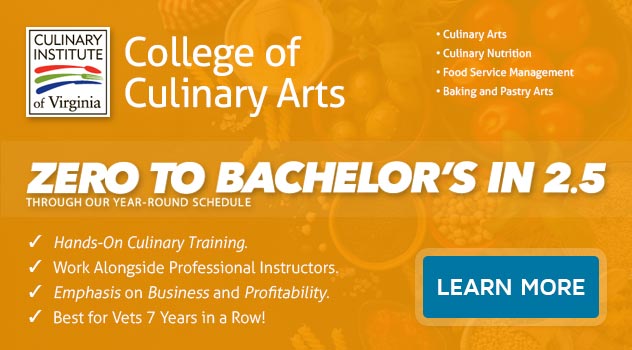What it Takes to be a Chef: Hard and Soft Skills You Will Need
With a degree in culinary arts, you are on your way to becoming the boss in the kitchen. However, the role of a chef isn’t only about cooking food. It takes skills, dedication, and patience to reach this respected position. To achieve this goal, you need to know what it takes to succeed in this position, as well as the importance of formal education in preparing you for your future role.
Skills Needed to Succeed as a Chef
Academic qualifications and passion may land you a job as a chef, but your skills will determine your success. To help you excel in your position, you need both hard and soft skills:
Hard Skills
Hard skills are job-specific skills that you need to perform your duties. You can acquire them through training or formal education. To succeed as a chef, the following hard skills are essential:
Food Preparation Skills: It goes without saying that as a chef, your cooking skills should be top-notch. You should be able to follow recipes and efficiently prepare a variety of dishes. Other skills like tasting as well as the ability to identify flavors and balance seasoning are also important. You should also be well-versed with basic food preparation techniques like baking, poaching, sautéing and grilling just to name a few.
Business Skills: As a chef, your duties also probably include making sure the restaurant is profitable. This requires you to have business sense including knowledge of accounting, budgeting, and inventory control. Business management skills help you in running the restaurant economically. They also come in handy if you want to go the entrepreneurship route and take care of all financial information yourself.
Kitchen Management Skills: With the kitchen as your forte, you need to keep it in order and running smoothly all the time. You require kitchen skills like sanitation and hygiene in addition to culinary expertise. You should also know a thing or two about first aid in case of burns or cuts that may occur in the kitchen. The ability to plan menus and manage kitchen staffing also go a long way in keeping you at the top of your game.
Soft Skills
You may have all the technical skills in the kitchen but without the right personal attributes, your chances of success become small. Here are a few soft skills could help you along your journey:
Creativity: You need creativity and open-mindedness to try out new recipes, come up with unique flavors and improve existing dishes. It doesn’t help if you are offering nothing new to your clients, and always replicating existing recipes. Creativity extends to menu making, preparation, and food presentation at the table--you need ambiance. You want your food to appeal to as much of your clients’ senses as possible, not just the taste buds. Make every meal an experience!
Attention to Detail: It’s all about accuracy in the kitchen; be it in measuring ingredients and timing cooking time or monitoring temperatures and managing food portions. Your accuracy should be impeccable, as one little mistake can render a whole meal inedible and hurt your reputation. Your keen eye also comes in handy in ensuring that meals meet all standards before it is presented to customers.
Organization Skills: Chefs have a myriad of duties and are required to multitask. This requires the ability to plan tasks well. Good organization skills ensure everything runs smoothly and minimizes chaos in the kitchen.
How Formal Education Equips You with Skills as a Chef
Formal education, particularly a culinary arts degree program, could equip you with necessary skills to help you scale the culinary ladder. You should obtain these skills through courses covering the basics, more advanced culinary arts, and the business aspects of managing an eatery.
You could build your foundation with topics like mise en place and kitchen organization, cooking methods and principles and baking fundamentals, then advance to recipe and menu development among others. You could also explore culinary operations management and get a taste of inventory control and purchasing management.
Externships should give you practical skills and hands-on experience in the kitchen. A degree, therefore, helps shape you into a competent and holistic individual ready for any kitchen: whether an independent restaurant or a franchise.
The Importance of Education in Culinary Arts
While post-high school training is not mandatory in the culinary arts, most employers prefer hiring educated and experienced individuals. As more people opt for culinary schools and colleges, it only shows how important education is in this field. A few benefits of a culinary arts degree:
- It could help you build meaningful networks
- You could get training on essential skills and knowledge that you won’t find in an on-the-job training program
- It might expand your creativity and you get to experiment making different dishes
- Education is generally a ticket to better prospects
- It keeps you competitive in the job market
Is Becoming a Chef the Right Move for You?
Are you interested in a degree in the culinary arts? ECPI University offers an Associate of Applied Science in Culinary Arts degree program at an accelerated pace. For more information, connect with a friendly admission representative today!
It could be the Best Decision You Ever Make!
DISCLAIMER – ECPI University makes no claim, warranty, or guarantee as to actual employability or earning potential to current, past or future students or graduates of any educational program we offer. The ECPI University website is published for informational purposes only. Every effort is made to ensure the accuracy of information contained on the ECPI.edu domain; however, no warranty of accuracy is made. No contractual rights, either expressed or implied, are created by its content.
For more information about ECPI University or any of our programs click here: http://www.ecpi.edu/ or http://ow.ly/Ca1ya.




